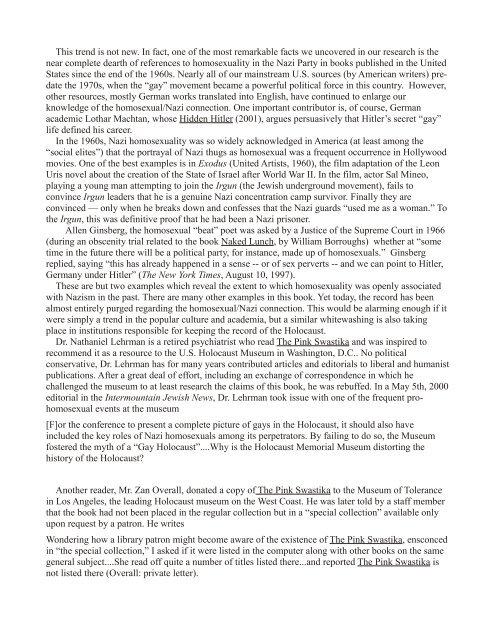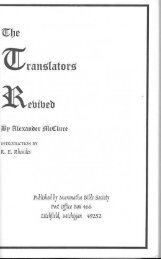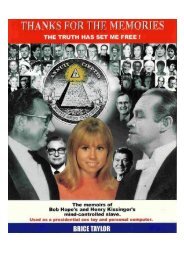THE PINK SWASTIKA - Shattering Denial
THE PINK SWASTIKA - Shattering Denial
THE PINK SWASTIKA - Shattering Denial
You also want an ePaper? Increase the reach of your titles
YUMPU automatically turns print PDFs into web optimized ePapers that Google loves.
This trend is not new. In fact, one of the most remarkable facts we uncovered in our research is the<br />
near complete dearth of references to homosexuality in the Nazi Party in books published in the United<br />
States since the end of the 1960s. Nearly all of our mainstream U.S. sources (by American writers) predate<br />
the 1970s, when the “gay” movement became a powerful political force in this country. However,<br />
other resources, mostly German works translated into English, have continued to enlarge our<br />
knowledge of the homosexual/Nazi connection. One important contributor is, of course, German<br />
academic Lothar Machtan, whose Hidden Hitler (2001), argues persuasively that Hitler’s secret “gay”<br />
life defined his career.<br />
In the 1960s, Nazi homosexuality was so widely acknowledged in America (at least among the<br />
“social elites”) that the portrayal of Nazi thugs as homosexual was a frequent occurrence in Hollywood<br />
movies. One of the best examples is in Exodus (United Artists, 1960), the film adaptation of the Leon<br />
Uris novel about the creation of the State of Israel after World War II. In the film, actor Sal Mineo,<br />
playing a young man attempting to join the Irgun (the Jewish underground movement), fails to<br />
convince Irgun leaders that he is a genuine Nazi concentration camp survivor. Finally they are<br />
convinced — only when he breaks down and confesses that the Nazi guards “used me as a woman.” To<br />
the Irgun, this was definitive proof that he had been a Nazi prisoner.<br />
Allen Ginsberg, the homosexual “beat” poet was asked by a Justice of the Supreme Court in 1966<br />
(during an obscenity trial related to the book Naked Lunch, by William Borroughs) whether at “some<br />
time in the future there will be a political party, for instance, made up of homosexuals.” Ginsberg<br />
replied, saying “this has already happened in a sense -- or of sex perverts -- and we can point to Hitler,<br />
Germany under Hitler” (The New York Times, August 10, 1997).<br />
These are but two examples which reveal the extent to which homosexuality was openly associated<br />
with Nazism in the past. There are many other examples in this book. Yet today, the record has been<br />
almost entirely purged regarding the homosexual/Nazi connection. This would be alarming enough if it<br />
were simply a trend in the popular culture and academia, but a similar whitewashing is also taking<br />
place in institutions responsible for keeping the record of the Holocaust.<br />
Dr. Nathaniel Lehrman is a retired psychiatrist who read The Pink Swastika and was inspired to<br />
recommend it as a resource to the U.S. Holocaust Museum in Washington, D.C.. No political<br />
conservative, Dr. Lehrman has for many years contributed articles and editorials to liberal and humanist<br />
publications. After a great deal of effort, including an exchange of correspondence in which he<br />
challenged the museum to at least research the claims of this book, he was rebuffed. In a May 5th, 2000<br />
editorial in the Intermountain Jewish News, Dr. Lehrman took issue with one of the frequent prohomosexual<br />
events at the museum<br />
[F]or the conference to present a complete picture of gays in the Holocaust, it should also have<br />
included the key roles of Nazi homosexuals among its perpetrators. By failing to do so, the Museum<br />
fostered the myth of a “Gay Holocaust”....Why is the Holocaust Memorial Museum distorting the<br />
history of the Holocaust?<br />
Another reader, Mr. Zan Overall, donated a copy of The Pink Swastika to the Museum of Tolerance<br />
in Los Angeles, the leading Holocaust museum on the West Coast. He was later told by a staff member<br />
that the book had not been placed in the regular collection but in a “special collection” available only<br />
upon request by a patron. He writes<br />
Wondering how a library patron might become aware of the existence of The Pink Swastika, ensconced<br />
in “the special collection,” I asked if it were listed in the computer along with other books on the same<br />
general subject....She read off quite a number of titles listed there...and reported The Pink Swastika is<br />
not listed there (Overall: private letter).









